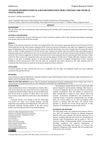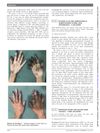2 citations,
January 2015 in “Elsevier eBooks” Epigenetic changes contribute to autoimmune skin diseases.
33 citations,
December 2014 in “Journal of the European Academy of Dermatology and Venereology” Lichen planus is linked to several autoimmune diseases.
54 citations,
April 2011 in “Journal of Multidisciplinary Healthcare” SLE patients often face depression and anxiety due to physical changes, with African-American and Hispanic patients having higher unmet psychological needs.
January 2011 in “Liaoning Zhongyiyao Daxue xuebao” The traditional Chinese medicine treatment improved symptoms and was more effective for SLE patients.
 June 2017 in “Journal of evolution of medical and dental sciences”
June 2017 in “Journal of evolution of medical and dental sciences” Most lupus patients in coastal Kerala had skin-specific lesions that could help diagnose the disease, and non-specific skin issues were linked to more severe, systemic lupus.
 January 1989 in “Clinical and Experimental Dermatology”
January 1989 in “Clinical and Experimental Dermatology” The symposium concluded that hair growth involves complex processes, including the hair follicle life cycle, the role of the dermal papilla, hair strength, pigmentation, and the impact of diseases and treatments like minoxidil on hair and skin.
 9 citations,
February 2011 in “Biologics: Targets & Therapy”
9 citations,
February 2011 in “Biologics: Targets & Therapy” Topical calcineurin inhibitors, especially 0.1% tacrolimus ointment, are effective and well-tolerated for treating cutaneous lupus erythematosus but require more research for standard treatment guidelines.
 88 citations,
January 2011 in “Annals of Dermatology”
88 citations,
January 2011 in “Annals of Dermatology” The document concludes that specific itchy skin diseases during pregnancy have varying fetal risks and treatments, including corticosteroids and other medications.
5 citations,
October 2020 in “Veterinary record case reports” Fluorescent light energy may help treat skin infections in dogs with calcinosis cutis.
1 citations,
January 2011 in “Journal of the American Academy of Dermatology” The combination of minoxidil and cyclosporine improved hair growth in short anagen syndrome.
2 citations,
January 2022 in “JAAD Case Reports” The rash resolved after stopping ponatinib.
 27 citations,
February 2009 in “Autoimmunity Reviews”
27 citations,
February 2009 in “Autoimmunity Reviews” The European Society of Cutaneous Lupus Erythematosus created a questionnaire to standardize patient assessment and improve care for cutaneous lupus.
 13 citations,
June 1984 in “Postgraduate Medicine”
13 citations,
June 1984 in “Postgraduate Medicine” Pregnancy can cause various skin changes, including pigmentation, acne, and stretch marks, and may affect preexisting skin conditions.
 20 citations,
January 2018 in “Expert opinion on emerging drugs”
20 citations,
January 2018 in “Expert opinion on emerging drugs” JAK inhibitors may soon be a safe and effective treatment for alopecia areata.
97 citations,
January 2006 in “Dermatology” imTA and pulse therapy are effective for alopecia areata with manageable side effects, but relapse rates need improvement.
 33 citations,
February 1996 in “Journal of The American Academy of Dermatology”
33 citations,
February 1996 in “Journal of The American Academy of Dermatology” Treat scalp and beard fungal infections early with oral antifungal medication and sometimes topical therapy, avoiding unnecessary allergy tests and surgery.
 1 citations,
October 2011 in “PubMed”
1 citations,
October 2011 in “PubMed” Teen hair loss is common, can be caused by genetics or health issues, and can be diagnosed and treated.
 10 citations,
July 2008 in “Journal of Cutaneous Pathology”
10 citations,
July 2008 in “Journal of Cutaneous Pathology” Increased mucin in the skin might indicate lupus in patients with hair loss, but more research is needed.
 22 citations,
November 2007 in “Journal of Investigative Dermatology Symposium Proceedings”
22 citations,
November 2007 in “Journal of Investigative Dermatology Symposium Proceedings” Hair growth and health are influenced by stress and hormones.

Hair chemicals don't cause SLE but may increase skin issues in those with SLE.
 April 2021 in “International Journal of Research in Dermatology”
April 2021 in “International Journal of Research in Dermatology” A child with a rare scalp condition regrew hair after treatment.
 25 citations,
March 2012 in “Journal of Dermatological Science”
25 citations,
March 2012 in “Journal of Dermatological Science” Genetic variants linked to ten skin diseases were found, showing both immune and non-immune factors play a role.
 35 citations,
October 2012 in “Dermatologic Clinics”
35 citations,
October 2012 in “Dermatologic Clinics” Autoimmune diseases can cause hair loss, and early treatment is important to prevent permanent damage.
 43 citations,
November 2007 in “Journal of Investigative Dermatology Symposium Proceedings”
43 citations,
November 2007 in “Journal of Investigative Dermatology Symposium Proceedings” The document concludes that proper diagnosis and treatment of common scalp disorders are important for both physical and psychological health.
 February 2024 in “Benha Journal of Applied Sciences”
February 2024 in “Benha Journal of Applied Sciences” Androgenetic alopecia is common hair loss caused by genetics and hormones.
4 citations,
January 2018 in “Journal of dermatology & dermatologic surgery” There is no gold standard treatment for hidradenitis suppurativa due to insufficient evidence.
 March 2024 in “Poster presentations”
March 2024 in “Poster presentations” A woman with lupus and Kikuchi-Fujimoto disease improved with treatment.
 March 2024 in “Poster presentations”
March 2024 in “Poster presentations” Anifrolumab improves quality of life and reduces steroid use in SLE patients.
 2 citations,
December 2023 in “Mediterranean Journal of Rheumatology”
2 citations,
December 2023 in “Mediterranean Journal of Rheumatology” Late onset SLE has different symptoms and antibody profiles compared to young onset SLE.

Psychosis can be an early sign of neuropsychiatric lupus, treatable with tailored medication.




















